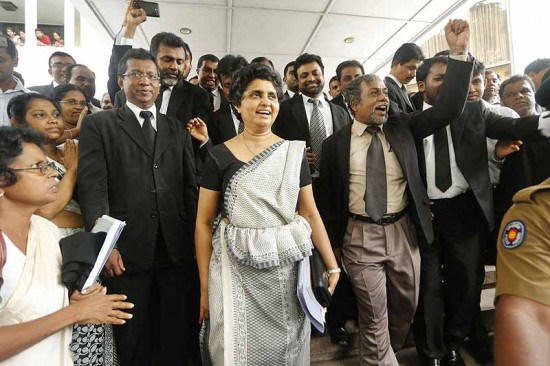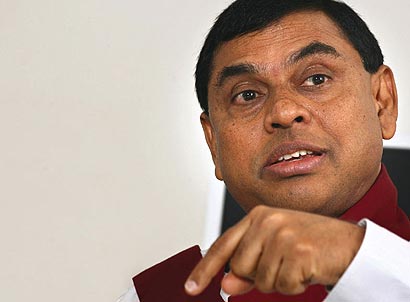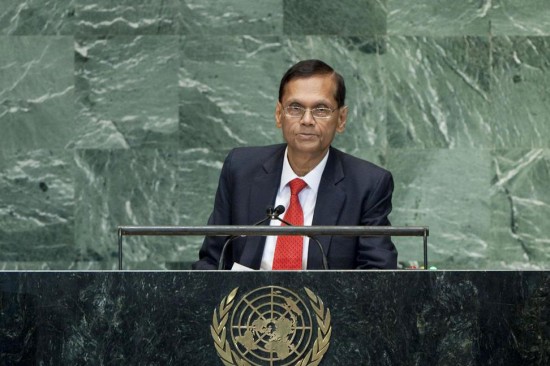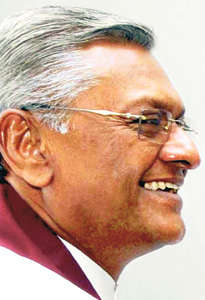Validity of Parliament’s interpretation of the Constitution – re OPA response
On 26th September, 2012 at the request of the National Issues Committee of the OPA, I drafted a press statement which was issued by the then President on 27th September under his signature and was thereafter unanimously approved by the OPA Forum on 28th September 2012.
Sad to say, the only apparent result of that statement was that external pressures brought to bear

Chief Justice Shirani Bandaranayaka leaves the Supreme Court Complex to face impeachment proceedings. Photo taken from courtesy from Outlook India.com
on that President who signed it, resulted in his giving notice of retirement (a constructive termination) from his post in the Public Service.
Blatant interference with the judiciary escalated progressively. I therefore moved the following Resolution at the OPA Executive Committee meeting held on 22.11.2012 .
Whereas, “to exercise and enjoy their Inalienable Sovereignty”, the people of Sri Lanka have delegated:– to their elected representatives in Parliament, their legislative power; to their elected

President’s brother Basil Rajapaksa who is also the Minister of Economic Development and the man who will most benefit from the Divineguma Bill which was shot down as unconstitutional by the Supreme Court
President their executive power; and to the Judiciary, the exercise of their Judicial power, save and except in matters relating to the privileges, immunities and powers of Parliament and of its Members, which may be exercised directly by Parliament according to law.
And whereas, the responsibility of ensuring strict observance of the Rule of Law rests primarily with the Judiciary, which exercises the aforementioned Judicial Power of the People delegated to them,
And whereas, observance of the Rule of Law can only be achieved if the Judiciary is independent of any pressures from the Executive, from the Legislature and/or from any other source,
And whereas, the special power to impeach a Judge of the Supreme Court or the Court of Appeal is explicitly limited to instances of “proved misbehaviour or incapacity”,
And whereas, the standard of proof required for proof of such misbehaviour or incapacity, is necessarily very high (as observed by the Parliamentary Select Committee that considered the resolution to impeach Chief Justice Neville Samarakoon in 1984),
And whereas, such proof can never be based on political considerations and can only be based on the findings of an Independent Panel of Judicial Officers,
And whereas, the process already set in motion to consider impeachment of the Chief Justice in terms of Standing Order No. 78A, which violates Article 74(1)(ii) read with Article 4(c) of the Constitution in that it gives Judicial Power to a committee of Parliament and is therefore ultra vires the Constitution and, in any event, clearly falls far short of the mandatory standards of objectivity and independence envisaged by the Sovereign People,
And whereas, impeachment of the Chief Justice in these circumstances, will irrevocably destroy any semblance of Judicial Independence, and will cause irreparable damage to Sri Lanka,
The Executive Council of the Organisation of Professional Associations assembled in Special General Meeting resolves that the Speaker, Chamal Rajapaksa, the President Mahinda Rajapaksa, the Minister of Economic Development, Basil Rajapaksa, Member of Parliament, Namal Rajapaksa and all other elected representatives of the Sovereign People who exercise Legislative and Executive powers delegated to them by the Sovereign People, be urged to:
(1) Stay further action in respect of the resolution to impeach the Chief Justice, and
(2) As set out in Article 151(4) of “The Constitution of the Republic of Sri Lanka Bill” presented in Parliament on 3rd August 2000 by the Parliamentary Select Committee chaired by Prof.

Holding a brief for a repressive regime: Prof G.L Peiris Sri LAnka’s External Affairs Minister seen here at the UN General Assembly sessions in New York in late 2012 making a case for Sri Lanka
G.L.Peiris, then Minister of Justice, Constitutional Affairs, Ethnic Affairs and National Integration and Deputy Minister of Finance in the S.L.F.P. Government of President Kumaratunga, of which the present Speaker and the present President were Ministers, after holding 77 meetings from 1994 – 1997 and having taken into account and fully considered the views of all political parties expressed in a series of discussions with such political parties which commenced soon after the Presidential Election of 1999 and continued until July 2000 either, to amend Article 107(3) of the Constitution to provide, or, to ensure that, in terms of existing Article 107(3) of the Constitution, Parliament, by law, shall provide that:
“A resolution for the presentation of such an address shall not be entertained by the Speaker or placed on the Order Paper of Parliament unless –
(a) notice of such resolution is signed by not less than one-third of the total number of Members of Parliament and sets out full particulars of the alleged misbehavior or incapacity; and
(b) an inquiry has been held –
(i) in the case of the Chief Justice by a committee consisting of three persons each of whom hold, or have held, office as a judge in the highest court of any Commonwealth country;
(ii) in the case of every other judge of the Supreme Court, the President of the Court of Appeal and every other Judge of the Court of Appeal, by a committee consisting of three persons who hold, or have held, office as a Judge of the Supreme Court or the Court of Appeal created and established by the Constitution or any other law,
and appointed by the Speaker to inquire into allegations of misbehaviour or incapacity made against the Chief Justice or such Judge, as the case may be, and such committee has found that the allegation of misbehaviour or incapacity has been established against the Chief Justice or such Judge.
This was immediately seconded by another member. During the ensuing discussions it became clear that many professionals, including lawyers, were still under the obsolete view that “Parliament was supreme”. I agreed to the suggestion that the names of the Rajapaksa be deleted, stated that those minor deletions may be done by the Seconder and left the meeting about 8.15 p.m. Strangely, the resolution has been watered down but the requests to the President, Speaker and all elected representatives has not been altered.
As the situation deteriorated rather rapidly, on 31.12.2012 I notified the OPA General Secretary that I wished to move the following Resolution at the meeting of the OPA Forum on 03.01.2013.
“Whereas the Forum endorsed a press statement issued by the President calling on the Executive not to undermine the Judiciary in exercising the Judicial power of the Sovereign People,
And whereas this call has apparently fallen on deaf ears,
And whereas the threat of an unprecedented Constitutional Crisis and ensuing chaos in Sri Lanka is increasingly imminent,
And whereas in the present circumstances, only exemplary statesmanship on the part of H.E. the President can effectively reverse this ominous trend,
The Forum of the OPA resolves to urge the President, in the long term interests of our motherland, to take timely steps to avoid this catastrophe, by suspending the process of impeachment already initiated, and permitting saner counsel to prevail.
On the previous occasion it became clear to me that many professionals still held onto the obsolete view that “Parliament was supreme”. Hence the paper titled “Validity of Parliament’s Interpretation of the Constitution” was prepared by me, primarily for their benefit, as a position paper to introduce my resolution. I honestly could not even conceive of any professional having any objection to such a humble appeal for exemplary statesmanship, and in view of the urgency forwarded it to all those (including many from the OPA) on my mailing list, before the meeting.
Even before I could move the Resolution, the same individual seconded the motion, thus preventing the person who was to second it from doing so. After a belated discussion, the seconder, who has necessarily to be deemed to have seconded every single statement in the Resolution, without exception, requested me to delete a certain statement in the Resolution. He had done this on the previous occasion as well, and mutilated that Resolution. I refused to accede to this request of his. He then withdrew his secondment of the motion.
Sensing a strong feeling in the OPA, that the President should be left to do what he chooses to do, I did not pursue the resolution. In the meantime Colombo Telegraph had published this memo under the Caption “Siripala, Wickremasinghe and the validity of Parliament’s Interpretations of the Constitution.”
I shall refrain from commenting on the snide reference to a no-confidence motion made by the President for the sole reason that I still believe that the OPA has great potential, provided it has strong independent, leadership, to make a significant contribution to discourage unlawful acts by those who have sworn to uphold and defend the Constitution. I felt flattered when a VVIP introduced me when I was OPA President, to a visiting VVIP that I was the President of the most powerful Organisation in the country.
My only response was that I would very much have liked to believe that assessment. However far removed the reality may be, I will not cease to believe in the possible realisation of that potential with the correct leadership. That infamous resolution was passed not at the Special General Meeting but by a group of belligerent individuals, after the meeting had been duly terminated. A similar situation is likely to arise if Parliament debates the impeachment based on an invalid finding of the Parliamentary Select Committee and action is taken in pursuance of such a vote.

